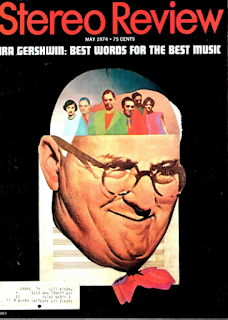Random notes and other items regarding the studio album by Dutch guitarist Jan Akkerman recorded and released in 1973 on Atlantic.
Showing posts with label Julian Bream. Show all posts
Showing posts with label Julian Bream. Show all posts
20210310
20200814
20191024
From Stereo Review May '74
RECORDING OF SPECIAL MERIT
JAN AKKERMAN: Tabernakel. Jan Akkerman (guitar); orchestra. House of the King;
Javeh; Lammy; A Pavan by Thomas Morley;
and six others. ATCO SD 7032 $5.98, 0 TP
7032 $6.98. © CS 7032 $6.98.
Performance: Lovely
Recording: Excellent
Jan Akkerman. the guitarist with Focus, has brought out one of the most interesting albums of the year. On a variety of guitars, (acoustic, bass, electrical), his playing suggests that the pop Julian Bream has arrived. If it were only on the basis of his work in the traditionally inspired material, such as John Dowland's Britannia or Morley's Pavan then I might be tempted to judge him as a gifted technician with a peculiarly Seventies approach to the classics. But when he shifts gears into one of his own compositions, such as House of the King, with its rock beat and his vital performance on electric guitar, and proceeds to produce some of the most elegant sounds that I've ever heard in rock, then I know that I'm listening to a real artist. Akkerman is still developing, but all of the preliminary sketches for what will come are clearly there: the technique, of course, the compositional ability, the beauty of the sound he draws from his instrument, and the sheer order of his musical conceptions I don't mean order in the Teutonic sense of one must and one will; instead he seems to sense the truth of the French dictum that it is impossible to achieve true elegance without order. (Imagine the park of Versailles planted in blue spruce, or finishing off a dinner at Caravelle with a Hostess Twinkie. or Catharine Deneuve accenting her Givenchy with patent-leather high heels and turned-over athletic socks, and I think you'll get an idea of what I mean. Akkerman already knows all the components that go into a pleasing musical experience, and he displays them with the assured grace of a great gourmet ordering a dinner for you. If all this strikes you as a mite too civilized, too unspontaneous to be representative of true rock, then let me remind you that rock is well into its third decade, stagnating faster and faster, and could use the dynamism of an obviously trained musical mind. In fact, if rock is to be saved at all, it is people like Akkerman who will do it, not a soon-to-be-old Mick Jagger going through his over-rehearsed paces some time in the I980's with all the aplomb of a Ruby Keeler. "Tabernakel" is the kind of straw-in-the-wind album that makes reviewing fun.
Peter Reilly
20181120
Akkerman talks about the album
 |
| David Bowie on the night in question |
For the recently published Box Set of Akkerman albums Jan has commented on each of the albums for a booklet that accompanies the 26 discs. On Tabernakel he has written
This album proved a great opportunity. Producer Geoffrey Haslam introduced me to arranger George Flynn insisting "Jan, he's your man". Thanks to Atlantic boss Ahmet Ertugun, engineer Gene Les Paul (son of) and the New York Philharmonic came on board. We made the album in a week.(1) From my perspective, new instruments such as Moog synthesizers (2) in the seventies marked a musical renaissance. I wanted to connect the modern with traditional lute music and that was the general philosophy behind Tabernakel. Once I'd discovered old Mediaeval lute material and Julian Bream's work (3), I immediately went to Cambridge University to make photocopies of the tablatures (4). I only found out later that I could have bought them at Schott's music on Great Marlborough Street in London! (5) At the time I couldn't incorporate any lute playing in Focus so I recorded it for my third solo record instead. To record the lute, Gene plastered the instrument with so many Barcus Berry pick-ups (6) (purchased at Mannys in NYC (7)) that consequently it looked like a hospital patient! I knew Tim Bogert and Carmine Appice from Vanilla Fudge (8) and they were great guys to record with and understood exactly how I wanted to do things.
House of the King was done on the Coral electric sitar, (9) an instrument I discovered in the States in early 1973, and I use a genuine sitar on the record
Javeh, (10) the Jewish name for the Lord, came to me while staring upon the wide landscape of Friesland where I was living at the time. The piece starts a little restlessly but turns into an impressionistic and calm piece. In February 1974, I wanted to perform Javeh at the prestigious Grand Gala du Disque (the Dutch equivalent of the grammys) (11) and invited George Flynn to assist the orchestra with the arrangements. The performance, which was performed live on television, didn't go to plan and I decided to play solo. After the first few bars, I felt uncomfortable and decided to walk away. This happened in front of David Bowie and other celebrities (12), but I've never regretted it for a moment.
(1) Sounds like a slight exaggeration but maybe not
(5) See here
(6) In 1963, experiments initiated by violinist John Berry and electronics visionary Les Barcus, gave birth to the first ever piezo crystal transducer for musical instruments. Many further innovations have been made since. For more, see here.
(7) There from 1935-2009. See this Wikipedia article here.
(11) The event on Friday February 15 was the last time the event was televised. For details of the many others performing that day see here.
(12) David Bowie is not listed above but he is mentioned here on Wikipedia.
20121005
Subscribe to:
Posts (Atom)


